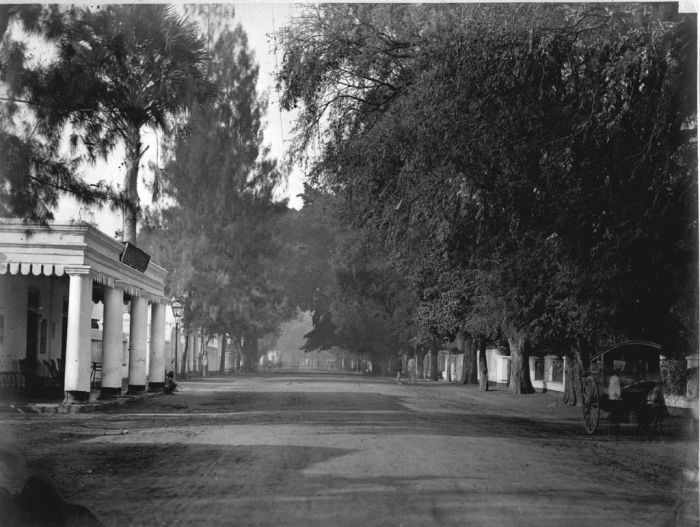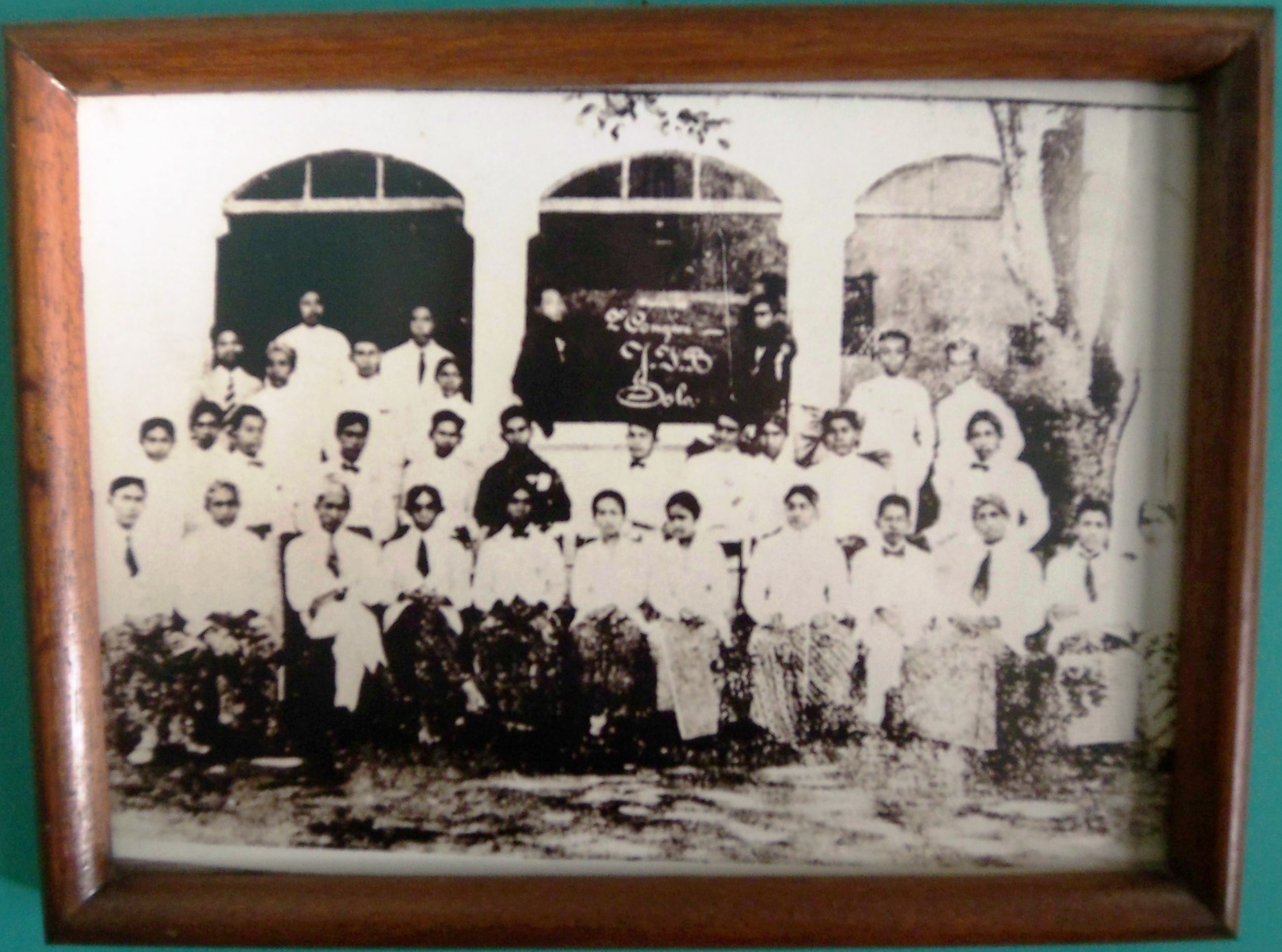|
Hamid Algadri
Hamid Algadri or Hamid Al-Gadri ( ar, حامد القدرى, ; 1912-1998) was a pioneer of freedom for Indonesian independence who was meritorious in Linggadjati Agreement, Renville Agreement, Dutch–Indonesian Round Table Conference (, ) and one of the members of parliament in the founding days of the Republic of Indonesia. Early life Hamid was born in Pasuruan on July 10, 1912. In the beginning, he had difficulty in securing entry to a Dutch elementary school ''Europeesche Lagere School'' due to his non-Caucasian race and age, succeeding only after his father lied about his age to look two years older and persistence of his grandfather by threatening to return his medal of Netherlands if Hamid was not admitted. His father was an Arab Muwallad named ''Muhammad'', and his paternal grandfather named ''Alim Algadri'', a Hadhrami descent born in Surat, India who married a local Indian woman and later migrated to East Java and was given position as the Kapten Arab in Pasuruan, ... [...More Info...] [...Related Items...] OR: [Wikipedia] [Google] [Baidu] |
Pasuruan
Pasuruan ( nl, Pasoeroean) is a city in East Java, Java, Indonesia. It had a population of 186,262 at the 2010 Census and 208,006 at the 2020 Census. It is surrounded by, but administratively separate from, Pasuruan Regency. It is located around 65 kilometers southeast of Surabaya. Administrative districts Pasuruan is divided into four districts (''kecamatan''), tabulated below with areas and their population at the 2010 and 2020 Censuses.Badan Pusat Statiustik, Jakarta, 2021. Note: (a) Panggungrejo District created since 2010 from parts of neighbouring districts; its population in 2010 is included with that of the districts from which it was formed. Climate Pasuruan has a tropical savanna climate (Aw) with little to no rainfall from May to November and heavy rainfall from December to April. Public transport Pasuruan located and connected by provincial main road between Surabaya―Banyuwangi. Pasuruan can be reached from Surabaya by bus or local commuter train Sura ... [...More Info...] [...Related Items...] OR: [Wikipedia] [Google] [Baidu] |
Kapitan Arab
Kapitan Arab or Kapten Arab (Captain of the Arabs; nl, Kapitein der Arabieren; ar-at, الكابتن العرب, al-Kābitin al-'Arab) or ''Head of The Arabs'' ( nl, Hoofd der Arabieren; ar-at, القائد العرب , al-Qā'id al-'Arab) is a position in the colonial Dutch East Indies appointed with the task of leading the ethnic Arab-Indonesians, who usually lived in concentrated clearly defined-living areas (''Kampung#Southeast Asia, Kampung Arab''). The role was to provide liaison between his community and the government, to provide statistical information to The Dutch East Indies government on issues related to Arabs, to disseminate government regulations and decrees, and to ensure the maintenance of law and order. History In History of Jakarta, Batavia, The Arabs, according to L.W.C van den Berg, Van den Berg, settled in an area called Pekojan. ''Pekojan'' is from Indonesian word ''Pe-Koja-an'', which means ''The Koja'', a term for Muslim people of Gujarat, India. Whi ... [...More Info...] [...Related Items...] OR: [Wikipedia] [Google] [Baidu] |
Japanese Occupation Of The Dutch East Indies
The Empire of Japan occupied the Dutch East Indies (now Indonesia) during World War II from March 1942 until after the end of the war in September 1945. It was one of the most crucial and important periods in modern Indonesian history. In May 1940, Germany occupied the Netherlands, and martial law was declared in the Dutch East Indies. Following the failure of negotiations between the Dutch authorities and the Japanese, Japanese assets in the archipelago were frozen. The Dutch declared war on Japan following the 7 December 1941 Attack on Pearl Harbor. The Japanese invasion of the Dutch East Indies began on 10 January 1942, and the Imperial Japanese Army overran the entire colony in less than three months. The Dutch surrendered on 8 March. Initially, most Indonesians welcomed the Japanese as liberators from their Dutch colonial masters. The sentiment changed, however, as between 4 and 10 million Indonesians were recruited as forced labourers ('' romusha'') on economic deve ... [...More Info...] [...Related Items...] OR: [Wikipedia] [Google] [Baidu] |
Batavia, Dutch East Indies
Batavia was the capital of the Dutch East Indies. The area corresponds to present-day Jakarta, Indonesia. Batavia can refer to the city proper or its suburbs and hinterland, the Ommelanden, which included the much-larger area of the Residency of Batavia in the present-day Indonesian provinces of Jakarta, Banten and West Java. The founding of Batavia by the Dutch in 1619, on the site of the ruins of Jayakarta, led to the establishment of a Dutch colony; Batavia became the center of the Dutch East India Company's trading network in Asia. Monopolies on local produce were augmented by non-indigenous cash crops. To safeguard their commercial interests, the company and the colonial administration absorbed surrounding territory. Batavia is on the north coast of Java, in a sheltered bay, on a land of marshland and hills crisscrossed with canals. The city had two centers: Oud Batavia (the oldest part of the city) and the relatively-newer city, on higher ground to the south. It was ... [...More Info...] [...Related Items...] OR: [Wikipedia] [Google] [Baidu] |
University Of Indonesia
The University of Indonesia ( id, Universitas Indonesia, abbreviated as UI) is a public university in Depok, West Java and Salemba, Jakarta, Indonesia. It is one of the oldest tertiary-level educational institutions in Indonesia (known as the Dutch East Indies when UI was established), and is generally considered one of the most prestigious universities in Indonesia, along with the Gadjah Mada University and Bandung Institute of Technology. In the 2019 QS World Universities Ranking, UI is ranked 1st in Indonesia, 57th in Asia and 292nd in the world. History The roots of UI date back to 1851. At that time, the colonial government of the Dutch East Indies established a school to train medical assistants. Training lasted for two years, and the graduates were certified to provide basic medical treatments. The degree conferred was Javanese Doctor, as the graduates were certified only to open their practice in the Dutch East Indies, especially Java. The program became more comprehe ... [...More Info...] [...Related Items...] OR: [Wikipedia] [Google] [Baidu] |
Agus Salim
''Haji'' Agus Salim (; October 8, 1884 – November 4, 1954) was an Indonesian journalist, diplomat, and statesman. He served as Indonesia's Minister of Foreign Affairs between 1947 and 1949. Early life Agus Salim was born Masjhoedoelhaq Salim on October 8, 1884, in the village of Koto Gadang, a suburb of Fort de Kock. His father, Sutan Mohammad Salim, was a colonial prosecutor and judge whose highest rank was chief judge for the indigenous court in Tanjung Pinang. His birth name, which translates into "defender of truth", was changed into Agus Salim early in his childhood. Salim received his elementary education at ''Europeesche Lagere School''; at that time, it was considered a privilege for a non-European child to attend an all-European school. He continued his studies at the ''Hogere Burgerschool'' in Batavia, and graduated with the highest score in the whole Dutch East Indies. Salim's father had applied (and was granted) for his two sons, Agus and Jacob, to be granted equ ... [...More Info...] [...Related Items...] OR: [Wikipedia] [Google] [Baidu] |
Jong Islamieten Bond
Jong Islamieten Bond (JIB) or ''Islamic youth association'' was a youth organization during Dutch East Indies ruling established in Batavia on January 1, 1925. The organization was established by Indonesian young students with the first goal to provide courses on Islam to Muslim students to engage the sense of brotherhood amongst the educated Muslim youth from different regions of the archipelago who were previously members of local associations, such as Jong Java (March 7, 1915), Jong Sumatra (December 9, 1917), and others. JIB was not a political organization. The first elected chairman at the first JIB Congress in 1925 in Yogyakarta, Samsurijal, when giving the speech said, "In the courses, lectures and debates which we hold, we try as far as possible to enhance the understanding of religion and politics especially from the point of Islam to members, but JIB will not join any political activities". The composition of the first Executive Committee of the newly created JIB were: Ra ... [...More Info...] [...Related Items...] OR: [Wikipedia] [Google] [Baidu] |
Algemene Middelbare School
Algemene Middelbare School or AMS (Dutch, "General Secondary School") was during part of the twentieth century a level of education in the Netherlands (and the Dutch East Indies), comparable with the high school level in the US education system. Its successors were the mavo and vbo, now both replaced by vmbo. See also * Education in the Netherlands Education in the Netherlands is characterized by division: education is oriented toward the needs and background of the pupil. Education is divided over schools for different age groups, some of which are divided in streams for different education ... References Education in Indonesia Schools in the Dutch East Indies {{Indonesia-stub ... [...More Info...] [...Related Items...] OR: [Wikipedia] [Google] [Baidu] |
Meer Uitgebreid Lager Onderwijs
Meer Uitgebreid Lager Onderwijs (Dutch, "more advanced primary education") was during part of the twentieth century a level of education in the Netherlands (and the Dutch East Indies), comparable with the junior high school level in the US education system. Its successors were the mavo and vbo, now both replaced by vmbo. This level of education was used up to 2021 in Suriname, when it was replaced with "voortgezet onderwijs". In Suriname, MULO was a four year program. It was split into MULO-A which was focused on business and MULO-B which was focused on science. After graduating, students could move onto three-year VWO leading to university or a two-year HAVO leading to higher vocational training. See also * Education in the Netherlands Education in the Netherlands is characterized by division: education is oriented toward the needs and background of the pupil. Education is divided over schools for different age groups, some of which are divided in streams for different educatio ... [...More Info...] [...Related Items...] OR: [Wikipedia] [Google] [Baidu] |
Education In Indonesia
Education in Indonesia falls under the responsibility of the Ministry of Education, Culture, Research, and Technology (''Kementerian Pendidikan, Kebudayaan, Riset, dan Teknologi'' or ''Kemdikbudristek'') and the Ministry of Religious Affairs (''Kementerian Agama'' or ''Kemenag''). In Indonesia, all citizens must undertake twelve years of compulsory education which consists of six years at elementary level and three each at middle and high school levels. Islamic, Christian, Catholic, and Buddhist Schools are under the responsibility of the Ministry of Religious Affairs. Education is defined as a planned effort to establish a study environment and educational process so that the student may actively develop their own potential in religious and spiritual level, consciousness, personality, intelligence Intelligence has been defined in many ways: the capacity for abstraction, logic, understanding, self-awareness, learning, emotional knowledge, reasoning, planning, creativit ... [...More Info...] [...Related Items...] OR: [Wikipedia] [Google] [Baidu] |
Dutch Language
Dutch ( ) is a West Germanic language spoken by about 25 million people as a first language and 5 million as a second language. It is the third most widely spoken Germanic language, after its close relatives German and English. ''Afrikaans'' is a separate but somewhat mutually intelligible daughter languageAfrikaans is a daughter language of Dutch; see , , , , , . Afrikaans was historically called Cape Dutch; see , , , , , . Afrikaans is rooted in 17th-century dialects of Dutch; see , , , . Afrikaans is variously described as a creole, a partially creolised language, or a deviant variety of Dutch; see . spoken, to some degree, by at least 16 million people, mainly in South Africa and Namibia, evolving from the Cape Dutch dialects of Southern Africa. The dialects used in Belgium (including Flemish) and in Suriname, meanwhile, are all guided by the Dutch Language Union. In Europe, most of the population of the Netherlands (where it is the only official language spoken country ... [...More Info...] [...Related Items...] OR: [Wikipedia] [Google] [Baidu] |









